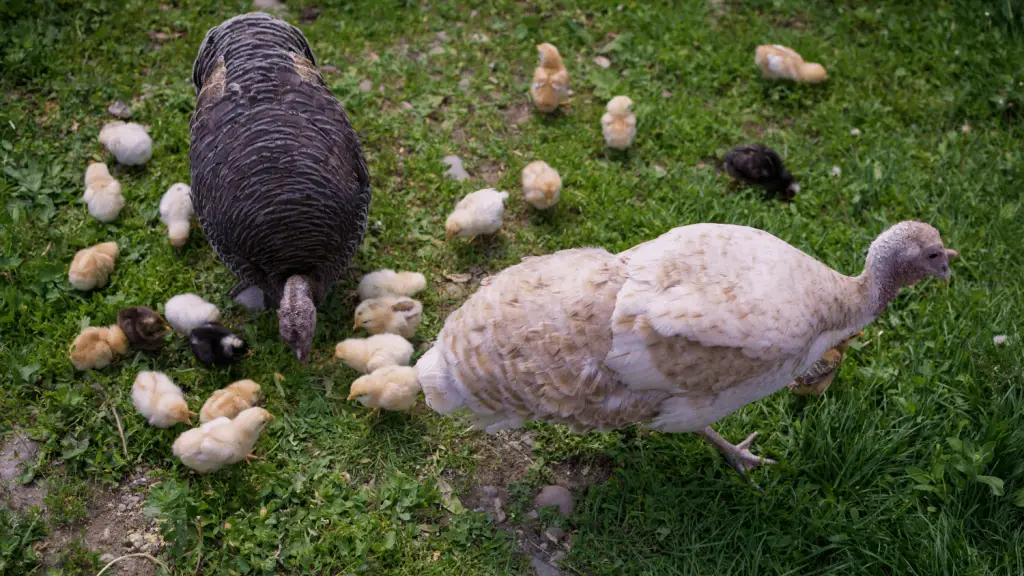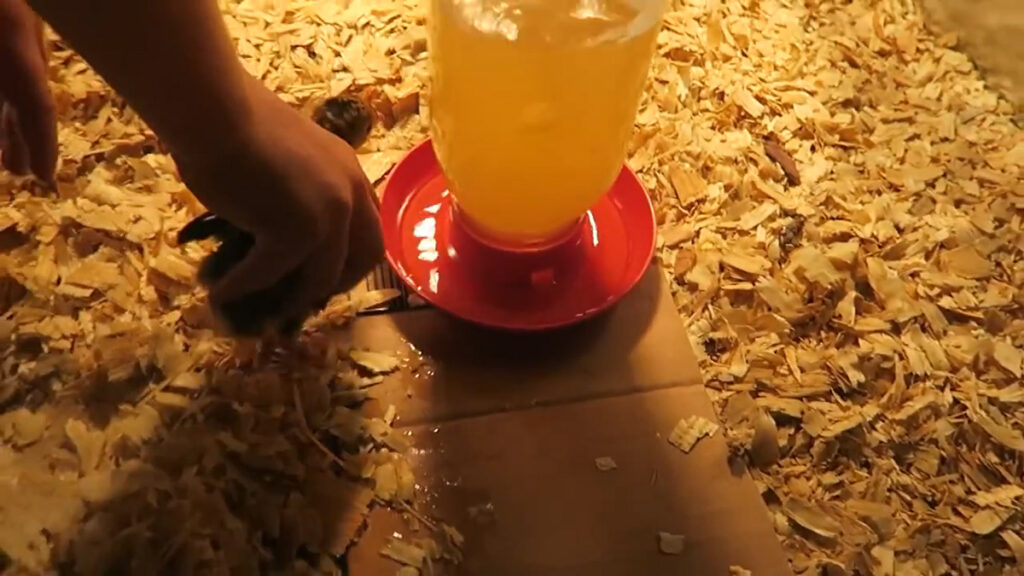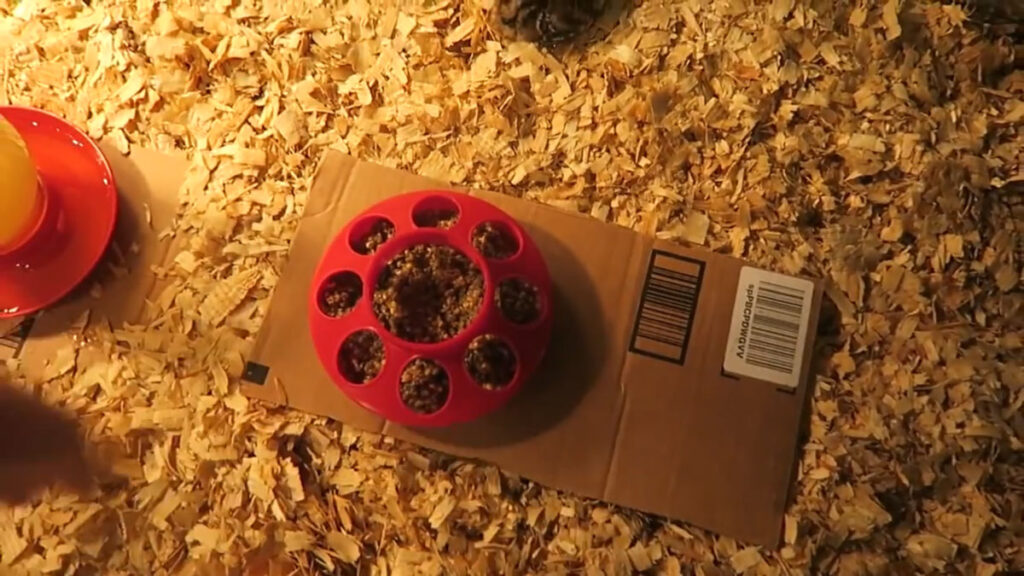Free Range organic turkeys are extremely expensive at over $8 a pound. This game bird can be difficult to find so we decided to try raising turkey poults ourselves. We chose the Bronze Breasted turkey poults, and our results were astounding!.
Taking care of turkeys isn’t too different from taking care of chicks once they hatch from their eggs and are small enough to hold in your hand.
Learn these small differences in how to raise baby turkeys by knowing what you’ll need, how to make a good turkey brooder, and what the turkeys should eat and drink.
Raising healthy, thriving turkey poults starts with feeding them the right diet from day one. As cute little fluff balls, turkey chicks have very specific nutritional needs to support their rapid growth and development. Knowing what to feed turkey chicks is essential for success.
In this complete guide, we’ll cover everything you need to know about feeding poults, including:
- Key nutrients for turkey chicks
- Recommended feed types by age
- Feeding schedule and access
- Common mistakes to avoid
- Supplements and treats
Follow these turkey chick feeding tips and your poults will grow up happy and strong!
Turkey Chick Nutrition Needs
Turkey poults require high levels of protein and other nutrients to fuel their fast growth Here are some key nutrition facts
-
High Protein – Poults need 26-28% protein in starter feed, more than chick starter. This builds muscle.
-
Amino Acids – Turkey chicks benefit from methionine, lysine and other amino acids for development.
-
Niacin – This B vitamin prevents blackhead disease in poults Quality feeds have sufficient niacin,
-
Prebiotics – Soluble fiber improves digestion and gut health in young poults.
-
Vitamins A, D, E – These support immune function and growth
Feed made specially for turkey chicks contains the right mix of protein, amino acids, vitamins and minerals they need.
Turkey Starter Feed: 0-8 Weeks
For the first 8 weeks, feed poults a complete turkey starter feed. Look for crumbles or pellets with 26-28% protein from quality ingredients.
This provides the high protein levels turkey poults need for optimal muscle growth in early development. Feed turkey starter free choice so poults can eat small, frequent meals around the clock.
Refill feeders often and prevent waste. Place feeders low to the ground so tiny poults can easily reach.
Transition Feed: 8-25 Weeks
At 8 weeks old, transition poults to a grower feed with 24-26% protein, also specially formulated for young turkeys.
This intermediate feed meets protein needs as poults get bigger and prepare for adulthood. Let your poult’s size and growth rate guide when you transition between 8-12 weeks old.
Finisher Feed: 6+ Months
After about 6 months, growing poults can move to an adult turkey ration or game bird feed with 16-18% protein.
Finisher feeds have less protein and more carbs and fat to provide energy. They support finishing growth and prepare poults for laying hen diets.
Providing Correct Feeding Access
Making feed readily available is also crucial for turkey chicks:
-
Feed poults starter feed immediately after hatching – within 6-12 hours. The yolk only lasts so long!
-
Allow poults to eat small, frequent meals day and night. Keep feeders full.
-
Preventions waste by only pouring small amounts into feeders, and refill as needed.
-
Move feed closer to heat sources as poults venture out more from the brooder area.
Healthy Supplements and Treats
While commercial feed has complete turkey chick nutrition, you can also supplement with:
-
Chopped greens – spinach, kale, lettuce
-
Mealworms
-
Plain yogurt
-
Cooked oatmeal
-
Chopped fruits and veggies
-
Cooked eggs
Offer treats in moderation, no more than 5-10% of total diet. Wait until poults are 2-3 weeks old so their digestive system can handle new foods.
Common Turkey Chick Feeding Mistakes
Avoid these common feeding errors:
-
Giving medicated chick starter instead of specific poult starter feed.
-
No immediate access to feed after hatching.
-
Letting feed get old, wet or moldy.
-
Transitioning feed at the wrong age.
-
Introducing treats or supplements too early before the sensitive digestive system has developed.
Following the right schedule and amounts for what to feed turkey chicks ensures your poults get the nutrition they need to thrive!

What Do Baby Turkeys Eat?
Baby turkeys need to eat a blend created especially for their development and growth. Never feed a poult food created for older turkeys as this will create a choking hazard.
You can find turkey starters at any farm or feed store but choose one that contains at least 28 protein grams per serving since young turkeys have a high protein feed requirement. We like this New Country Organic Turkey Starter that we were able to get at our local feed store.
We recommend fermenting young turkey feed. To ferment their feed, soak it for 2-3 days and then scoop out rations with a strainer.
Baby turkeys will also need grit (small rocks) and will enjoy fresh greens from your garden.

What Will I Need to Raise Baby Turkeys?
- Another name for a brooder is a brooding house. This is where your baby turkeys will live. Tractor Supply sold us a metal 8’x2′ trough that worked great. The trough was kept in our house so the chicks would stay at room temperature. They were able to jump out after a few weeks, so I built a wire cage on top to stop that.
- Turkey chicks need to stay warm for the first few weeks of their lives, so heat lamps are very important. That’s too hot if your chicks are lying down far from the heat lamp. They aren’t warm enough if they are piled up. We first used a regular heat lamp bulb, but we saw that our birds were calmer and slept better at night with a red bulb. Tip: Set the heat lamp to 95 degrees when you bring the chicks home. The heat can be lowered by 5 degrees a week until the turkeys have all of their feathers.
- Bedding – Baby turkeys should be kept warm and dry. Pine shavings are a great bedding for baby turkeys. Make sure the shavings are big enough for the baby turkeys not to be able to eat them. Place it a few inches down and clean up any turkey waste that you can see. Lay fresh bedding as needed.
- Feeder: As babies, turkeys will need a heavy-duty plastic feeder base that they can put on the ground. It will be raised off the ground as the turkey gets bigger.
- Waterer – Baby turkeys need a lot of fresh water. We love how easy it is to connect this threaded poultry water base to a one-quart mason jar. Turkey babies can easily drown, so start with this small waterer and move up to the half-gallon size as they get bigger.
- “Do turkeys need roosting bars?” You may ask. Well, you don’t have to give them one when they’re babies, but if you can put one in their brooder, they will start using it right away as the chicks get bigger. Giving an adult turkey a roost will make them feel safer and help them sleep better because they are naturally roosters. Get this free guide on how to make a turkey shaw when your birds are old enough to go to pasture.

Raising Turkey for Beginners – What you need to know to get started!
FAQ
What should I feed my turkey chicks?
Can I feed baby turkeys chick starter?
How to care for baby turkey chicks?
What is turkey starter feed?
What can I feed Turkey chicks?
Heritage breeds and meat breeds, in particular, may benefit from specialized mixtures of grains and pellets that a general-purpose commercial feed may not be able to provide. Here are some of the foods that you can use to feed turkey chicks.
What are the health benefits of ground turkey?
Ground turkey has multiple benefits. It is a good source of minerals, and B vitamins, rich in proteins, low in fat and it is lower in calories than common turkey.
Can you feed a Turkey Poult?
Feeding turkeys is not that dissimilar to feeding chickens in that turkeys require a starter crumb, then a grower’s pellet and a maintenance diet once they are mature. Turkey poults however have a much higher protein requirement than chicks and most poultry feeds will be unsuitable for turkey poults and may even lead to growth problems.
Do Turkey chicks need commercial feed?
There is no need to worry about providing commercial turkey feed for the turkey chicks that you have at home. These packages are commonly branded as gamebird feed and can be bought on amazon. They’re nutritionally balanced for different phases of growth, from hatching to adulthood, so you’ll be able to quickly pick the right one for your flock.
Should I feed chicken chicks and turkeys together?
Because turkeys grow to be much larger birds than chicks, this is important to ensure adequate growth. If you are brooding chicken chicks and turkey chicks together you should always go with the higher protein feed if possible. Chick starter typically has a protein percentage of 22 to 24%.
How do you feed a baby turkey?
Before you bring your baby turkeys home, you’ll want to set up your feeders, waterers, bedding, and heat lamp in the brooder. You’ll start your birds off with a poultry starter feed before switching to a grower feed after about ten weeks. Turkey feed can come in pellet, mash, or crumble form, though I prefer pellets.
